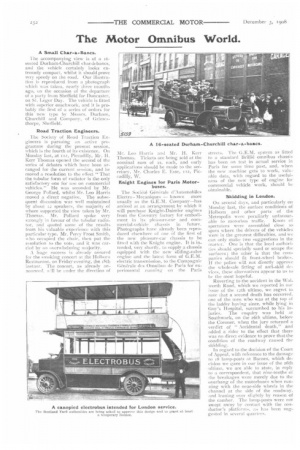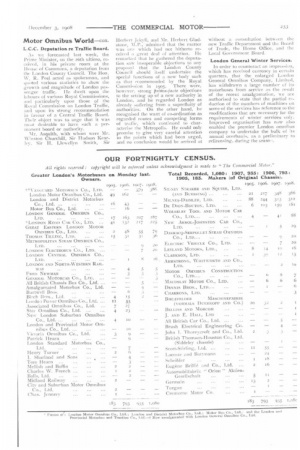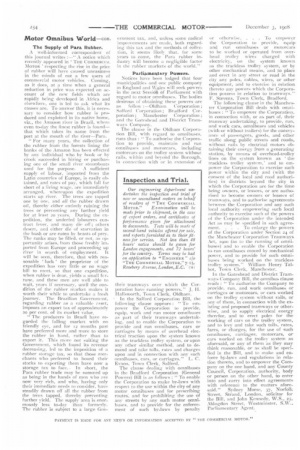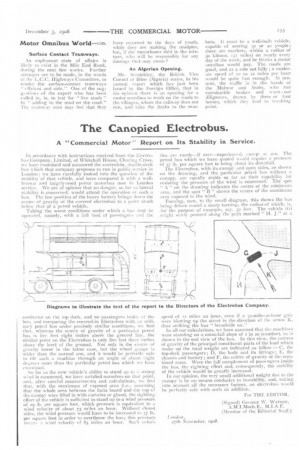The Motor Omnibus World.
Page 6

Page 7

Page 8

Page 9

If you've noticed an error in this article please click here to report it so we can fix it.
A Small Char-aBanes.
The accompanying view is of a 16seated Durham-Churchill char-a-bancs, and the vehicle certainly looks extremely compact, whilst it should prove very speedy on the road. Our illustration is reproduced from a photograph which was taken, nearly three months ago, on the occasion of the departure of a party front Sheffield for Doncaster, on St. Leger Day. The vehicle is fitted with superior coachwork, and it is probably the first of a series of orders for this new type by Messrs. Durham, Churchill and Company, of Grimesthorpe, Sheffield, Road Traction Engineers.
'Hie Society of Road 'fraction Engineers is pursuing an active programme during the present session, which is the fourth of its existence. On Monday last, at 112, Piccadilly, Mr. H. Kerr Thomas opened the second of the series of debates which have been arranged for the current session, and he moved a resolution to the effect " That the tubular form of radiator is the only satisfactory one for use on commercial vehicles." He was seconded by Mr. George Pollard, whilst Mr. Loo Harris moved a direct negative. The subsequent discussion was well maintained by about 12 speakers, the majority of whom supported the view taken by Mr. Thomas. Mr. Pollard spoke very strongly in favour of the tubular radiator, and quoted some of the results from his valuable experience with this particular type. Mr. Percy Frost Smith, who occupied the chair, then put the resolution to the vote, and it was carried by a n overwhelming majority.
A huge success is already assured for the smoking concert at the Holborn Restaurant, on Friday evening, the iSth instant. The concert, as already announced. will be under the direction of
Mr. Leo Harris and Mr. H. Kerr Thomas. Tickets are being sold at the nominal sum of Is. each, and early applications should be made to the secretary, Mr. Charles E. Esse, 112, Piccadilly, W.
Knight Engines for Paris Motor buses.
The Sociae Generale d'Automobiles ElectroMecaniques — known more usually as the G.E.M. Company—has arrived at an arrangement by which it will purchase Knight-Daimler engines from the Coventry factory for embodiment in its pleasure-car and commercial-vehicle chassis in future. Photographs have already been reproduced elsewhere of one of the first of the new pleasure-car chassis to be fitted with the Knight engine. It is in tended, very shortly, to supply a chassis equipped with the new sliding-valve engine and the latest form of G.E.M. electric transmission, to the Compagnie Generale des Omnibus de Paris for experimental running on the Paris streets. The G.E.M. system as fitted to a standard Brittle omnibus chassis has been on test in actual service in Paris for some time past, and, when the new machine gets to work, valuable data, with regard to the usefulness of the new type of engine for commercial vehicle work, should be obtainable.
Skidding in London.
On several days, and particularly on Monday last, the surface conditions of Holborn and other parts of the Metropolis were peculiarly unfavour able to motorbus traffic. Knots of spectators were assembled close to spots where the drivers of the vehicles were in the greatest difficulties, and we can only make two suggestions in the matter. One is that the local authorities should specially sand or scrape the surfaces; the other is that the companies should fit front-wheel brakes. If the police will not directly approve the wholesale fitting of anti-skid devices, these alternatives appear to us to be the most hopeful.
Reverting to the accident in the Wal worth Road, which we reported in ()iiiis:sue of the 12th ultimo, we regret to note that a second death has occurred, one of the men who was at the top et the ladder having since, while lying in Guy's Hospital, succumbed to his injuries. The enquiry was held at Southwark, on the 26th ultimo, before the Coroner, when the jury returned a verdict of " Accidental death," and added a rider to the effect that there was no direct evidence to prove that the condition of the roadway caused the skidding.
In regard to the decision of the Court of Appeal, with reference to the damage to 18 lamp-posts at Barnes, which decisim we gave in our issue of the 26th tiltimo, we are able to state, in reply to a correspondent, that nine-tenths of the breakages were merely due to the overhang of the motorbuses when running with the near-side wheels in the channel at the side of the roadway, and leaning over slightly,by reason of the camber. The lamp-posts were not swept away by contact with the conductor's platforms, as has been suggested in several quarters.
Motor Omnibus World—con.
L.C.C. Deputation re Traffic Board.
As we forecasted last week, the Prime Minister, on the 26th ultimo, received, in his private room at the I louse of Commons, a deputation from the London County Council. The Hon. W. R. Peel acted as spokesman, and quoted various statistics to show the growth and magnitude of London pas senger traffic. Ile dwelt upon the labours of various Royal Commissions, and particularly upon those of the Royal Commission on London Traffic, and upon its strong recommendation in favour of a Central Traffic Board. Ilicir object was to urge that it was 7110A desirable to have such a permanent board or authority_
Mr. Asquith, with whom were Mr. Winston Churchill, Sir Hudson Rearley, Sir II. Llewellyn Smith, Sir
Herbert Jekyll, and Mr. Herbert Gladstone, M.P., admitted that the matter was one which had not hitherto received a great deal of attention. He remarked that he gathered the deputation saw insuperable objections to any proposal that the London County Council should itself undertake the special functions of a new body such as that recommended by the Royal Colnmission in 1905. There were, however, sirong priina-facie objections to the setting up of a new authority in London, and he regarded London as already suffering from a superfluity of authorities. On the other hand, he recognised the want of co-ordination as regarded routes and competing forms of traffic, which continued to characterise the Metropolis He could only promise to give very careful attention to the points which had been urged, and no conclusion would be arrived at
without a consultation between the new Traffic Department and the Board of Trade, the home Office, and the Local Government Board.
London General Winter Services.
In order to counteract an impression, which has received currency in certain quarters, that the enlarged London General Omnibus Company, Limited, has withdrawn a large number of its motorbuses from service as the result of the recent amalgamation, we are authorised to state that the partial reduction of the numbers of machines on some of the services has reference to the modifications that are necessary for the requirements of winter services only. Improved organisation has now also enabled the premier London omnibus company to undertake the bulk of its annual overhauls, as a preliminary to relicensing, during the seaso-.
The Supply of Para Rubber.
A well-informed correspondent of this journal writes :—" A notice which recently appeared in 'THE COMMERCIAL MOTOR respecting the rise in the price of rubber will have caused uneasiness in the minds of not a few users of commercial motor vehicles. Corning, as it does, at a time when a general reduction in price was expected on account of the new fields which are rapidly being developed in Africa and elsewhere, one is led to ask what its causes are. To answer this, it is necessary to consider how rubber is produced and exploited in its native home, viz., the Amazon river in Brazil, where even to-clay the finest rubber is found-that which takes its name from the port at the mouth of the river—Pant.
" For many years, the collection of the rubber from the forests lining the banks of the Amazon has been effected by any individual who by hook or by crook succeeded in hiring or purchasing one of the small river steamboats used for the purpose. A sufficient supply of labour, imported from the Latin countries of Europe, is easily obtained, and rates of pay, which fall far short of a living wage, are immediately arranged, whereupon the expedition starts up river. The trees are tapped one by one, and all the rubber drawn off, thereby either entirely ruining the trees or preventing any further yield for at least so years. During the expedition, the underfed labourers contract fever, and many die off ; others desert, and either die of starvation in the bush or are eaten by beasts of prey. The ranks may be filled, or not, as opportunity arises, from those freshly imported from Europe and proceeding up river in search of employment. It will be seen', therefore, that with reasonable fuck ' the proprietor of the expedition has very little or no wage bill to meet, so that one expedition, when rubber is dear, yields a small fcrtune, and these men are well able to wait, years if necessary, until the condition of the rubber market makes it worth their while to undertake a fresh journey. The Brazilian Government, regarding rubber as a valuable asset, imposes an export tax of approximately 20 per cent, of its market value,
" The producers in Brazil have regarded the falling market with no friendly eye, and for 12 months past have preferred more and more to store the rubber in hand, rather than to export it. This move not suiting the Government, which found its revenue decreasing, led to the imposition of a rubber storage tax, so that those merchants who preferred to hoard their stocks to exporting them have now a storage tax to face.. In short, the Para rubber trade may be summed up as being in the hands of men who are now very rich, and who, having only their immediate needs to consider, have steadily drawn off all the rubber from the trees tapped, thereby preventing further yield. The supply area is enormously less to-day than formerly. The rubber is subject to a large Goy
ernment tax, and, unless some radical improvements are made, both regarding this tax and the methods of collection, it seems likely that, for sonic pars to come, the Para rubber industry will become a negligible factor in the rubber markets of the world."
ParliAmerttiory Pce.wers.
Notices have been lodged that four municipalities and one public company in England and Weles will seek powers in the next Session of Parliament with regard to motor omnibuses. The bodies desirous of obtaining these powers-are as follow :—Oldham Corporation ; Solford Corporation ; Bradford Corporation; Manchester Corporation ; and the Gateshead and District Tramways Company.
The clause in the Oldham Corporation Bill, with regard to omnibuses, runs thus : " To authorise the Corporation to provide, maintain and run omnibuses and motorcars, including motorcars on the trolley system without rails, within and beyond the Borough, in connection with or in extension of
their tramways over which the Corporation have running powers." I, H. Hallsworth, Town Clerk, Oldham.
In the Salford Corporation Bill, the following clause appears : " To empower the Corporation to provide, equip, work and run motor omnibuses as part of their tramways undertaking, and to enable the Corporation to provide and run omnibuses, cars or carriages by means of overhead electrical traction upon the system known as the trackless trolley system, or upon .any other similar method, and to demand and take tolls, rates and charges upon and in connection with any such omnibuses, cars, or carriages." I,. C. Evans, Town Clerk, Salford.
The clause dealing with omnibuses in the Bradford Corporation (General Powers) Bill is as follows " To enable the Corporation to make by-laws with respect to the use within the city of any motor omnibuses and for prescribing routes; and for prohibiting the use of any streets by any such motor omnibuses, and to provide for the enforcement of such by-laws by penalty
or Ot her W itiC. „ . Ty CIDIA over the Corporation to provide, equip.
and run omnibuses or motorcars.
to be worked or operated from overhead trolley wires charged with electricity, on the system knowtt as the trackless trolley system, or by other mechanical means, and _to place and erect in any street or road in the city any poles, cables, wires, or other equipment, and to exercise in relation. thereto any powers which the Corporation possess in relation to tramways."' F. Stevens, Town Clerk, Bradford.
The following clause in the Manchester Corporation Bill deals with onmibuses : " To empower the Corporation, in connection with, or as part of, their tramway undertaking, to provide, run, and work cars, omnibuses and vehicles (with or without trailers) for the conveyance of passengers, goods, and other traffic along public streets and roads,. without rails by electrical motors obtaining their energy from a generating station, by means of overhead-trolley lines on the system known as the trackless trolley system,' and to empower the Corporation to exercise such power within the city and (with the consent of the local and road authorities) in districts beyond the city in which the Corporation are for the time being owners, or lessees, or are authorised to become owners or lessees of tramways, and to authorise agreements, between the Corporation and any such local authority empowering such local authority to exercise such of the powers. ofthe Corporation under the intended Act as may be specified in such agree
ment To enlarge the powers. of the Corporation under Section 24 of the Manchester Corporation 1-rarriways Act, 1900 (as to the running of omnibuses) and to enable the Corporation to run omnibuses moved by mechanical power, and to provide for such omnibuses being worked on the trackless trolley system." William Henry Talbot, Town Clerk, Manchester.
In the Gateshead. and District Tramways Company Bill, the omnibus clause reads : " To authorise the Company to provide, run, and work omnibuses or carriages or motorcars, or cars worked on the trolley system without rails, or any of them, in connection with the existing and proposed tramways or otherwise, and to supply electrical energy therefor, and to erect poles for the working of cars on the trolley system, and to levy and take such toils, rates, fares, or charges, for the use of such omnibuses, carriages, motorcars, or cars worked on the trolley system as aforesaid, or any of them as the may think reasonabk, or as shall be specified in the Bill, and to make and enforce by-laws and regulations in relation thereto, and to empower the Company on the one hand, and any County Council, Corporation, authority, body or person on the other hand, to enter into and carry into effect agreements with reference to the matters aforesaid." Sydney Morse, 37, Norfolk Street, Strand, London, solicitor for the Bill, and John Kennedy, W.S., 25, Abingdon Street, Westminster, S.W., Parliamentary Agent. Surface Contact Tramways.
An unpleasant state of affairs is likely to exist in the Mile End Road, during the next few weeks. Further attempts are to be made, in the words of the L.C.C. Highways Committee, to render the surface-contact tramways efficient and safe." One of the suggestions of the expert who has been called in, is, to test for " live studs " by " adding to the mud on the road." The tramway men may feel that they have returned to the days of youth, while they are making the mudpies, but, if the motorbuses skid in the mixture, who will be responsible for any damage that may ensue?
An Algerian Opening.
Mr. Scratchley, the British Vice Consul at Bone (Algeria) stales, in his annual report which has just been issued by the Foreign Office, that in his opinion there is an opening for a motor omnibus to work on the roads to the villages, where the railway does not run, and take the Arabs to the mar
kets. Ii must be a well-built vehicle, capable of seating so or 40 people; there are markets, within a radius of so kiloms. (3r miles) on nearly every day of the week, and he thinks a motor omnibus would pay. The roads, are good, and as a rule not hilly ; a moderate speed of to to is miles per hour would be quite fast enough. At present, the traffic is in the hands of the Maltese and Arabs, who run ramshackle brakes and worn out diligences, drawn by three or four horses, which theV load to breaking point.
























